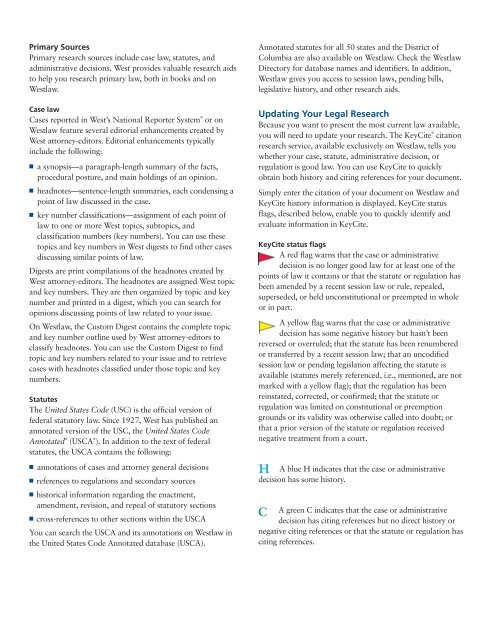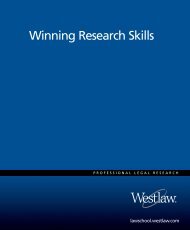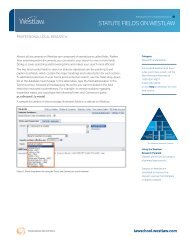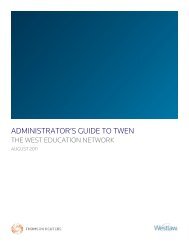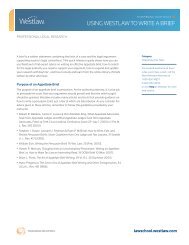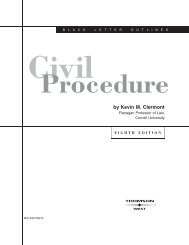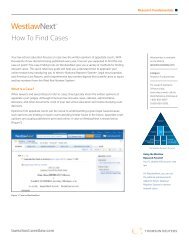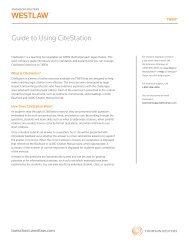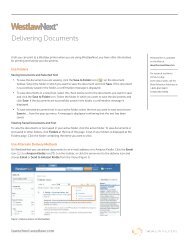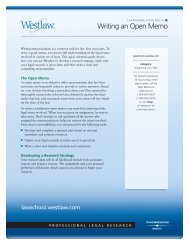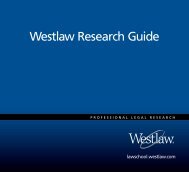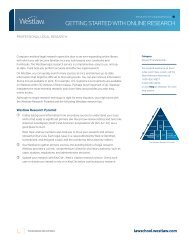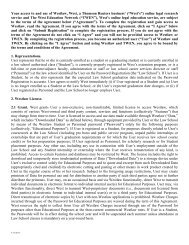WRITING AN OPEN MEMO - Westlaw
WRITING AN OPEN MEMO - Westlaw
WRITING AN OPEN MEMO - Westlaw
Create successful ePaper yourself
Turn your PDF publications into a flip-book with our unique Google optimized e-Paper software.
Primary Sources<br />
Primary research sources include case law, statutes, and<br />
administrative decisions. West provides valuable research aids<br />
to help you research primary law, both in books and on<br />
<strong>Westlaw</strong>.<br />
Case law<br />
Cases reported in West’s National Reporter System ®<br />
or on<br />
<strong>Westlaw</strong> feature several editorial enhancements created by<br />
West attorney-editors. Editorial enhancements typically<br />
include the following:<br />
■ a synopsis—a paragraph-length summary of the facts,<br />
procedural posture, and main holdings of an opinion.<br />
■ headnotes—sentence-length summaries, each condensing a<br />
point of law discussed in the case.<br />
■ key number classifications—assignment of each point of<br />
law to one or more West topics, subtopics, and<br />
classification numbers (key numbers). You can use these<br />
topics and key numbers in West digests to find other cases<br />
discussing similar points of law.<br />
Digests are print compilations of the headnotes created by<br />
West attorney-editors. The headnotes are assigned West topic<br />
and key numbers. They are then organized by topic and key<br />
number and printed in a digest, which you can search for<br />
opinions discussing points of law related to your issue.<br />
On <strong>Westlaw</strong>, the Custom Digest contains the complete topic<br />
and key number outline used by West attorney-editors to<br />
classify headnotes. You can use the Custom Digest to find<br />
topic and key numbers related to your issue and to retrieve<br />
cases with headnotes classified under those topic and key<br />
numbers.<br />
Statutes<br />
The United States Code (USC) is the official version of<br />
federal statutory law. Since 1927, West has published an<br />
annotated version of the USC, the United States Code<br />
Annotated ®<br />
(USCA ®<br />
). In addition to the text of federal<br />
statutes, the USCA contains the following:<br />
■ annotations of cases and attorney general decisions<br />
■ references to regulations and secondary sources<br />
■ historical information regarding the enactment,<br />
amendment, revision, and repeal of statutory sections<br />
■ cross-references to other sections within the USCA<br />
You can search the USCA and its annotations on <strong>Westlaw</strong> in<br />
the United States Code Annotated database (USCA).<br />
Annotated statutes for all 50 states and the District of<br />
Columbia are also available on <strong>Westlaw</strong>. Check the <strong>Westlaw</strong><br />
Directory for database names and identifiers. In addition,<br />
<strong>Westlaw</strong> gives you access to session laws, pending bills,<br />
legislative history, and other research aids.<br />
Updating Your Legal Research<br />
Because you want to present the most current law available,<br />
you will need to update your research. The KeyCite ®<br />
citation<br />
research service, available exclusively on <strong>Westlaw</strong>, tells you<br />
whether your case, statute, administrative decision, or<br />
regulation is good law. You can use KeyCite to quickly<br />
obtain both history and citing references for your document.<br />
Simply enter the citation of your document on <strong>Westlaw</strong> and<br />
KeyCite history information is displayed. KeyCite status<br />
flags, described below, enable you to quickly identify and<br />
evaluate information in KeyCite.<br />
KeyCite status flags<br />
A red flag warns that the case or administrative<br />
decision is no longer good law for at least one of the<br />
points of law it contains or that the statute or regulation has<br />
been amended by a recent session law or rule, repealed,<br />
superseded, or held unconstitutional or preempted in whole<br />
or in part.<br />
A yellow flag warns that the case or administrative<br />
decision has some negative history but hasn’t been<br />
reversed or overruled; that the statute has been renumbered<br />
or transferred by a recent session law; that an uncodified<br />
session law or pending legislation affecting the statute is<br />
available (statutes merely referenced, i.e., mentioned, are not<br />
marked with a yellow flag); that the regulation has been<br />
reinstated, corrected, or confirmed; that the statute or<br />
regulation was limited on constitutional or preemption<br />
grounds or its validity was otherwise called into doubt; or<br />
that a prior version of the statute or regulation received<br />
negative treatment from a court.<br />
A blue H indicates that the case or administrative<br />
decision has some history.<br />
C<br />
A green C indicates that the case or administrative<br />
decision has citing references but no direct history or<br />
negative citing references or that the statute or regulation has<br />
citing references.


